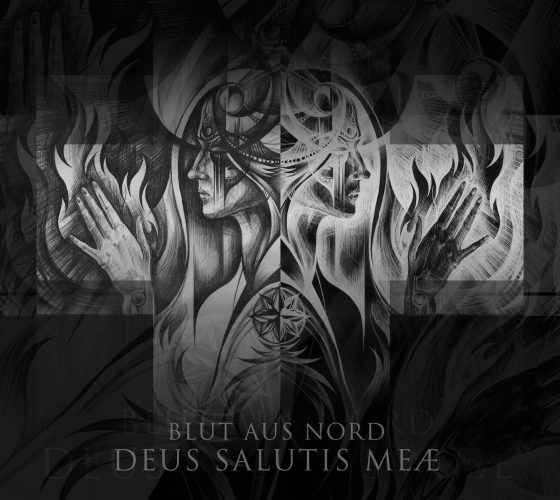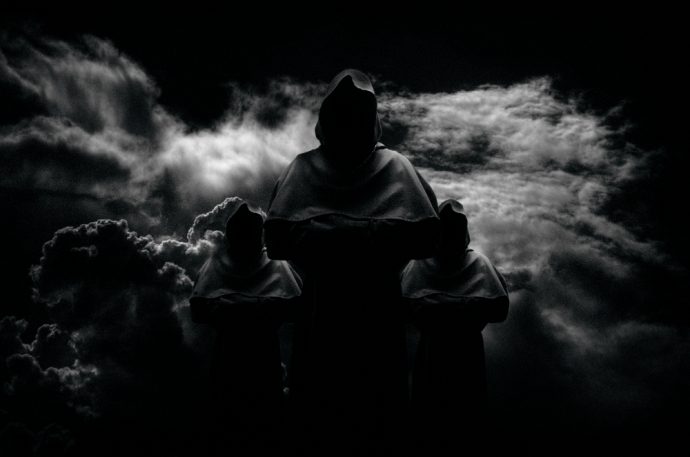At the bottom of this post you’ll find the first public streaming of a song from Deus Salutis Meæ (“God of My Salvation”), the new album by Blut Aus Nord. It’s the album’s fifth track and its name is “Apostasis“. It’s a great song by a groundbreaking band, and I wouldn’t blame you in the least if you skipped down and began listening, whether you continue reading what follows or not.
But if you’re curious about why I chose this song, how it fits within the album, and what else the album holds in store — though not in that precise order — read on.
Curiosity always runs high when a new Blut Aus Nord album appears on the horizon. Over more than two decades, the evidence has piled high that Vindsval follows his own muse, and no one else’s, and where that will lead him is difficult to predict, the most recent evidence being the four interconnected tracks on last year’s album-length split with Ævangelist, Codex Obscura Nomina (reviewed here). About all you can truly count on is a new opportunity to be surprised, and intrigued.
But because constancy and convention are usually only targets to be blasted by this band, maybe it won’t come as a surprise to hear that this album resists a simple characterization. It’s a sequence of alchemies with steady through-lines but also with variations, groupings of tracks introduced (or concluded) by voiceless compositions of largely synthesized ambient sound, none of which promise any peace and each of which is titled in the written language of the ancient Greeks.
If I had to sum up the album in two words, I would say this: Deus Salutis Meæ is titanic and hallucinatory, music that shakes the body to its core and spins depraved visions in the mind. But obviously, two words aren’t nearly enough. I have hundreds more to present.
In that old classical language, δημιουργός was the craftsman, the demiurge, a word that took on different shades of meaning depending on its context (and still does). In the old Homeric hymn to Hermes there is a line which translates, “but his dark ally the divine night was almost over, and dawn the craftsman was quickly coming”, while a character in the Ajax of Sophocles asks, “Didn’t the Fury forge this sword and Hades, the cruel craftsman, that belt?” In other contexts, it refers to the maker of the world.
I have no special insight into Vindsval’s choice of δημιουργός as the title of the album’s introductory track, which proves to be an eerie concoction, more hellish than heavenly, a layering of unsettling tones, ticking percussion, and chilling ambience. But there is something about that word which resonates as I think of the album as a whole.
In the album’s running order, δημιουργός is followed by the doomed, mid-paced “Chorea Macchabeorum“, which sounds like the terror of some vast subterranean tumult. Extravagantly textured, it heaves and booms with a massive low-end pulsation, and around that sound, which resembles tectonic plates in methodical motion, ambient tonalities swirl, snare strikes crack and cymbals shatter, warped chords rise and fall, dissonant excretions of sound spear the brain, and horrifying voices cry through strangled throats, wail in agony, and growl in crocodilian ecstasy.
The song has a repeating industrial drive of titanic proportions that hooks the head, almost inducing a hypnotic state, but it is a nightmarish trance that beckons, the sounds of construction or deconstruction in hell.
“Impius” is in a similar vein, a dense tumult of sound driven by a mountainous, repeating, low-end pulse and metronomic drum shots, and featuring another grotesque cacophony of mad voices. But this track seems more delirious, and more unsettlingly rapturous as choral voices rise in despair, or perhaps they manifest an intense longing for death.
And now comes one of those interludes, the fourth track entitled “γνῶσις“, the word we know as gnosis, or knowledge, another word whose meaning changes with context, and in some of those can be understood as insight into our true natures. Here, the ambient music is frigid, alien, haunting, void-like.
What immediately follows is the song we’re premiering today, “Apostasis“. It represents a subtle change in the stylistic flow of the album, a new kind of alchemy as I hear it.
And yes, it’s true that I selected it. I was granted the choice of this first premiere, so you can’t assume Vindsval would have made the same one, though maybe he would have. I didn’t think too long about it. If I had, I would have tied myself in knots, trying to pick apples or oranges. But something about this track compels me, like the bell to Pavlov’s dog.
“Apostatsis” still has the heaving, hammering, compulsive gigantism and the density of textures of the first two full songs, but other fascinating things happen here, too — shimmering, soaring bursts of ethereal and fearsome melody; truly monstrous examples of vocal distortion, producing the expressions of beasts that have no business speaking in our world; blasting percussion; dopplering and chiming tones; filaments of swooping and diving guitar solos that would make Jeff Hanneman smile; and bursts of magnetic riffage. This thing gets your neck in a vice, compels movement, produces an adrenaline surge, freezes the blood, fractures the mind. And I got flashes of King Crimson, too. Yes of course I picked this one.
But there is so much more to come… “Apostasis” is only the fifth of 10 tracks. I will spare you a further track-by-track dissection, and also avoid further specific spoilers.
What I will say is that the rest of the album, which includes one further interlude (“ἡσυχασμός“, which in some understandings refers to the process of retiring inward by ceasing to register the senses, in order to achieve an experiential knowledge of the divine), and three more full tracks, continues to marry staggering low-end frequencies and penetrating rhythms with storms of disturbing and densely layered sound.
Some of those storms are more cyclonic and demonic than others; the vocal effects in all of them are demonic; dashing keyboards and dive-bombing solos reappear; through much of this staggering assault, the music conjures visions of arcane mystery and death-loving majesty. The apocalypse looms, all too real, but so does the search for the divine.
Upon hearing the album, a friend said there were segments that sounded as if Vindsval were altering chunks of riffs from different Morbid Angel Covenant songs and solos, or slowing down and morphing Godflesh songs in bizarre and random fashion — not literally, of course, but when you hear the album, you’ll probably understand what spawned such thoughts.
It’s true that there is more warped industrial death and hallucinatory doom than black metal in this album. But let’s just leave it at this: Stylistically, the album may be a significant subterranean distance from the majesty and soul-flaring magnificence of Saturnian Poetry, but it is nonetheless a wondrous (and disturbing) experience, and one that’s just as immersive and enthralling.
This album is the solo work of Vindsval, aided only by the session vocals of Taysiah, who (as far as I can tell) last participated in 2003’s The Work Which Transforms God.
Deus Salutis Meæ was mixed and mastered by V. at Earthsound Studio and mastered by Bruno Varea at Upload-studio. The wonderful cover art was created by Anna Levytska.
The album will be released on October 27, 2017, by Debemur Morti Productions.
Physical Pre-order at DMP:
http://www.debemur-morti.com/en/12-eshop
Digital Pre-order at Bandcamp:
https://blutausnord.bandcamp.com/album/deus-salutis-meae
BLUT AUS NORD on Facebook:
http://www.facebook.com/blutausnord.official/



BAN create entire glorious yet uninhabitable worlds. Fantastic.
Need their new album in my life. Amazing review
A bit disappointing once again. BaN seems to have lost all finesse since the Liber / 777 era. He’s capable of so much more, and with a much better production job.
Bro. No. Keep smoking whack substances. Lmao.
I doubt whack substances would improve my opinion of this, sis.
Fair play, sir. I however do not understand what you wish from a Blut release. This seems pretty apt, in my opinion. I think the term, “follows his own muse” is good. I liked Saturnian. My favourite is In Mem II, But this is good. Not a Liber. But a more subtle Liber/s,
I think it’s just a case of not being surprised by BaN any more. To be honest I was hoping for something a bit more brooding, pushing into a different direction perhaps, rather than minor progressions with more dissonance thrown into the mix which everyone seems to be doing these days. I’ll wait for the full release to make up my final thoughts though.
I suppose I can accept that. Subjectively: I have found he tends to loop back to “older” before pushing newer. Just my feeling. Personally: I like this track a lot. But yes, let us see if the whole album sounds like this track. Then I will agree with the “Liber” assertion. Still to be honest, its always good to have a new BaN album.
Yes. Yes. Yes. Awesome work, yet again.